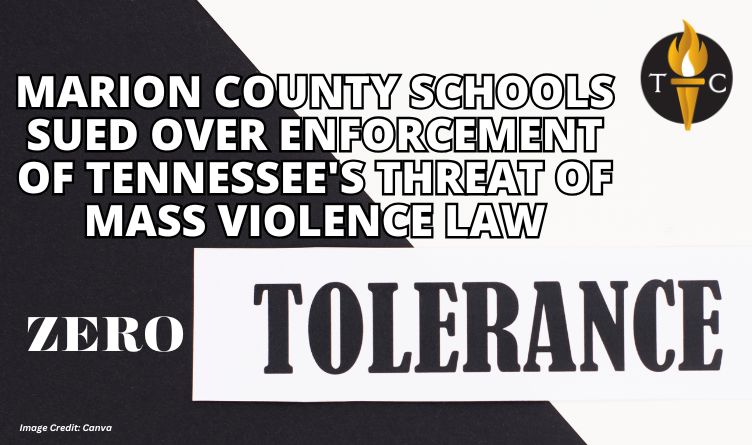Image Credit: Canva
The Tennessee Conservative Staff –
A Marion County family has filed a lawsuit against the county and its board of education, claiming that the district violated their teenage son’s First Amendment rights by misinterpreting a hyperbolic remark as a threat of mass violence.
The 14-year-old, referred to in court documents as John Doe, was arrested and expelled after telling a friend to “stop tapping that pencil before I bomb you.”

The lawsuit argues that this comment was simply hyperbole and not an actual threat. It contends that the student was punished for using a specific word, rather than the context in which it was said.
“No one believed Doe’s words were truly threatening,” the lawsuit states. “Doe was expelled simply because his words contained a magic word, ‘bomb.’ Expelling a student for making a threat that no one perceived as threatening is not rationally related to any legitimate state interest.”
Filed on Thursday in the U.S. District Court for the Eastern District of Tennessee at Chattanooga, this case adds to a growing list of legal challenges regarding Tennessee’s law on threats of mass violence. At least two other lawsuits are also contesting the law’s application.
According to state law, threats of mass violence encompass any act that a reasonable person would conclude could result in serious bodily injury or death to two or more individuals. Making such threats on school property or during school-related activities is treated as a zero-tolerance offense, leading to a one-year expulsion. A recent amendment to the law requires that a threat assessment be conducted to determine the validity of the threat before expulsion.
The lawsuit indicates that on August 20, the teen’s teacher overheard the comment and sent him unescorted to the principal’s office, documenting the statement as a bomb threat. The student waited about 15 minutes for the principal and school resource officer to arrive. After repeating his comment, he was arrested and charged with making a threat of mass violence on school property, leading to a 180-day expulsion.
The lawsuit claims that no threat assessment was conducted.
At a disciplinary hearing three days later, the presiding officer, David Smith, told the student, “Basically, if you say something like that in today’s society and today’s culture, the school has to take that as a threat. The use of the word ‘bomb’ is now just a zero-tolerance thing in the state of Tennessee.”
Smith noted that this new focus meant that the use of the word “bomb” would “automatically set off the radar.”
Another official referred to the situation as “our legislature’s kneejerk reaction” saying it was “how the law is written out.”
The lawsuit contests these statements, asserting, “The kneejerk reaction is the school district’s. The school district criminalized a word where the statute criminalizes a context in which the word is used.”
The teen’s punishment was later reduced to a one-semester placement at the Marion County Alternative School. The decision was appealed to the superintendent, who upheld the committee’s recommendation.

After an in-person meeting on September 9, the superintendent indicated he would consult with court officials and announce his decision after the student appeared in juvenile court later that week. However, the lawsuit claims that the superintendent has yet to provide a decision or present the appeal to the school board.
Justin Gilbert, a Chattanooga attorney representing the student, emphasized the importance of context. “Tennessee’s threat of mass violence law requires that schools use threat assessments and common sense to justify expelling young students over their words,” he stated in an emailed comment. “If we start expelling students for words taken out of context, everybody loses, not just the falsely-accused students, but also our public resources, our schools, police officers and courthouse personnel.”
The lawsuit seeks to reinstate the student to his regular school, as well as compensation for humiliation, mental anguish, and damage to reputation.




